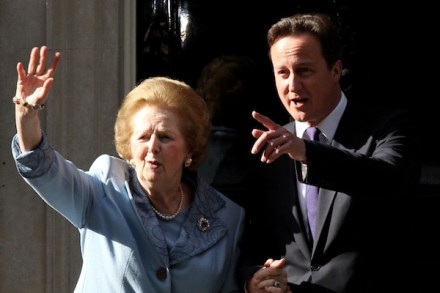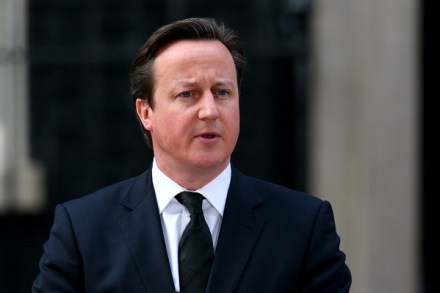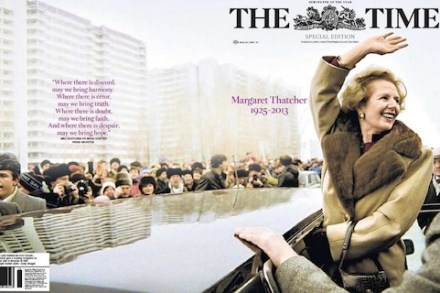Full text and audio: David Cameron’s tribute to Margaret Thatcher
listen to ‘David Cameron’s tribute to Margaret Thatcher, 10 Apr 13’ on Audioboo

Read about the latest UK political news, views and analysis.
listen to ‘David Cameron’s tribute to Margaret Thatcher, 10 Apr 13’ on Audioboo

With the debate swirling about Margaret Thatcher’s legacy and her government’s record, it’s worth taking a look at what the cold, hard economic data has to say about her time in office. Of course, growth rates and unemployment figures can’t tell us everything about a period, but they can at least provide a bit of substance to mix with the well-worn rhetoric. 1. Average growth. Under Thatcher, GDP rose by 29.4 per cent — an average of 0.6 per cent growth per quarter. (That’s the same as the average growth rate from 1955 to 2013.) 2. Manufacturing jobs lost, but more service jobs created. A net of 1.6 million


MPs on the Defence Select Committee made a similar warning this morning about the UK’s withdrawal from Afghanistan as Con Coughlin made in The Spectator last month. He wrote that Britain’s ‘attempt to undertake a dignified retreat from Kabul has all the makings of yet another Afghan disaster’. You can read the full piece here, but here are the main points that it makes, followed by the main warnings from the select committee’s report: 1. Is the ANSF ready to take over? Because of a failure to defeat or reach a political settlement with the Taleban, the withdrawal plan depends on trusting Afghan troops ‘who have already shown a worrying

It was never going to take long for football to become part of the Thatcher death row. Almost any big media story that involves stupidity, mawkishness, and tribal loyalty will inevitably be sucked into the national game. On Monday, Manchester United decided not to stage a minute’s silence for Mrs T – no surprise there – and now it’s turning into a nationwide fight. Some football people want to honour the Iron Lady, but the FA is reluctant. Reading FC chairman John Madejski has called for a tribute ahead of his side’s game against Liverpool FC, but the Liverpudlians so despise Thatcher that they will find the idea too offensive

It is 34 years since Margaret Thatcher became Prime Minister. Coincidentally, she entered Downing Street 34 years after Clement Attlee won the 1945 general election. The whole history of post-war Britain is cleaved, neatly, in two. If the first half of that story was dominated by a left-led consensus, the second has been a triumph for liberalism. We have lived in an era of liberal emancipation and are much the better for it. Mrs Thatcher, of course, was a great economic liberal. Her approach to economics, guided by Smith, Hayek and Friedman, stressed the importance of individual endeavour. Remove the dead hand of state control and Britain could flourish again.

No publication understood the Thatcher project better than The Spectator. We backed her for the leadership in 1975 when no other national publication would. We understood her opportunities, foibles and genius when many of our rivals were baffled by this coarse-sounding lady and her popular appeal. We have put together 21 essays from the period into our first-ever ebook: Margaret Thatcher in The Spectator 1975 – 1990. It’s available today on the Kindle, for just 99p. It begins with Patrick Cosgrave advocating Thatcher as Tory leader, then gives a six-month and one-year progress report. Ferdinand Mount describes the uneasiness that followed the 1979 triumph. Then, as now, The Spectator was

This afternoon’s tribute debate in the House of Commons will continue until 10pm, with many MPs wanting to pay their respects to Margaret Thatcher. There will be many speeches about how the former Prime Minister inspired and shaped the politics of those speaking. But there will also inevitably be those who want to talk about the negative aspects of her legacy. Ed Miliband, who gave a measured tribute on Monday, faces the challenge of giving a speech that isn’t insincere but that remains respectful too. Some of his MPs, such as John Healey, who has written a forceful piece for PoliticsHome, are boycotting the event. Others, such as David Winnick,
Here is something those who rely on political commentators will not have expected to see. The latest poll from TNS BMRB has the Tories down to just a quarter of the vote: CON 25% (-2), LAB 40% (+3), LD 10% (nc), UKIP 14% (-3). The Opinium/Observer online poll had LAB 38, CON 28, UKIP 17, LD 8% at the weekend. YouGov for the Sunday Times on the same day had CON 30, LAB 40, LD 11, UKIP 13. (The Tories were just 1% above their low point with firm.) How can this be? All these polls were taken during the raging welfare debate. Commentator after commentator wrote articles assuring us

Well, that was inevitable. Sir James Crosby’s announcement that he wants to give his knighthood back and forego a slice of his pension is surprising only in that it came a little sooner after the Parliamentary Commission on Banking Standards’ report than everyone expected. He could have waited for a real public outcry to build, as it did with Fred Goodwin, but instead he’s managed to walk off with a pension that’s still £406,000 and perhaps a little dignity. Fraser argued last week that politicians are the ones who should be squirming over the banking crisis, but what Crosby’s decision today shows is that the Banking Commission is wielding an

One of the criticisms of November’s elections for the new Police and Crime Commissioners was the lack of publicity garnered by the Government and the low turnout that inevitably greeted a vote held on a dark November day. Well, we’ve all certainly heard of one of the newly-elected PCCs now. The past few days has seen Kent’s PCC inadvertently pushing the maxim ‘any publicity is good publicity’ to the limit. Last Thursday, Ann Barnes was busy touring TV stations with her newly-appointed, seventeen year old ‘Youth Commissioner’. For about 48 hours, it seemed like great PR – with Paris Brown talking eloquently about her desire to reconnect the police with

A remarkable clip from an interview with Swedish television. No-one asks Margaret Thatcher to “jump” and gets away with it. One does rather think that some of her successors would have been happy to make fools of themselves in this fashion.
Conor Burns, a close friend of Margaret Thatcher, gave a fascinating interview with Radio 4’s The World at One today about his memories of the Iron Lady. Like so many accounts, it focused on Thatcher’s disregard for opinion polls and focus groups. Burns said: ‘I think it’s a failure of politics that looks too much at focus groups and too much at public opinion polls. Again, I remember last November showing her a poll in one of the Sunday papers and it showed that we were nine points behind, and she asked when the next election was, and I said it wasn’t for another two and a half years and


Conor Burns, a close confident of the late Baroness Thatcher, has lifted the lid on the former Prime Minister’s reaction to the biographical Meryl Streep film I mentioned yesterday. The Tory backbencher recounts: “I went from Leicester Square to watch the Iron Lady to Chester Square to have a gin and tonic with Lady T, and I told her ‘I’ve just been to see a film about you.’ She said ‘what do you mean a film about me?’. “I said: ‘Well they’ve made a film about your life and career as Prime Minister, and it’s an hour and half long’ and straight away, she said: ‘I couldn’t imagine anything worse’.”

On my way home last night, I dropped by Windrush Square in Brixton to observe an alternative reaction to Baroness Thatcher’s death. It was easy to find the party simply by following the cacophony. Around 200 people turned out to engage in a cold evening of drinking, dancing and heckling. Three competing sound systems blasted music against occasional shouts of ‘Maggie Maggie Maggie, dead dead dead’. Was the crowd attempting to make a serious point or was it just an excuse for a drunken party? These pictures should give you an impression of the impromptu event: Ironically from what I could see, many in the crowd appeared rather too young to remember Thatcher: some

MPs will pay tribute to Margaret Thatcher in the Commons tomorrow. One set of speeches worth listening to with some care will be those from the 2010 intake of Conservative MPs, raised during the Thatcher years, and often considered the group most enthusiastic about keeping her flame alive in the party. It is also likely that from this group will emerge the next Conservative leader. They are a confident bunch, bursting with ideas, books and essays about how to reinvigorate Conservatism. Paying tribute to the former Prime Minister will also be an opportunity for some of them to pay tribute to her policies, and perhaps her conviction in driving through
Tomorrow’s newspapers pay tribute to Margaret Thatcher, some praising her for changing Britain for the better, others nodding at her ability to divide opinions, even in death.

‘For many of us, she was, and is, an inspiration’, David Cameron said of Margaret Thatcher in his tribute to her. It was him, firmly — and proudly — placing himself in her tradition. Cameron has moved in Thatcher’s political direction as leader. He has become —partly, through circumstance and necessity — less interested in being a unifying figure, and more interested in getting things done. There has, in recent years, been an end to any attempts to distance the party from her legacy. Thatcher’s life-story is a truly remarkable one. Cameron rightly dwelled on the sexism she had to take on to become Tory leader. But she also had


Today we lost a great leader, a great Prime Minister and a great Briton. Margaret Thatcher didn’t just lead our country – she saved our country. And we should never forget that the odds were stacked against her. She was the shopkeeper’s daughter from Grantham who made it to the highest office in the land. There were people who said she couldn’t make it; who stood in her way; who said a woman couldn’t lead. She defied them all. She fought her way to a seat in Parliament…to the leadership of her Party…and then to lead our country…winning the backing of the British people three times in a row. She will be remembered for

The political tributes and barbs cast after the news of Margaret Thatcher’s death have been covered on Coffee House today, but what of the world’s other great egos: those in showbiz? Steerpike was impressed by Meryl Streep, who having played Thatcher in the controversial 2011 biographical film ‘The Iron Lady’, is slightly better placed than her Hollywood comrades to pass comment. Streep told the Washington Post: ‘to me she was a figure of awe for her personal strength and grit,’ and while she acknowledged Thatcher’s detractors, the actress has some rather sound opinions: ‘Her steadfast, almost emotional loyalty to the pound sterling has helped the UK weather the storms of European

In 1983, a Spectator piece argued that ‘the most faithful followers of the Thatcher cult are to be found within the Labour Party’. Baroness Thatcher’s passing was always going to be as much of a test for the Left as it would be a sad day for the Right. The Labour leadership knew this, and took care to craft statements and tweets which, while acknowledging the glaringly obvious political differences, praised Thatcher the woman. The party has suspended its political campaigning ahead of the local elections as a mark of respect. Ed Miliband’s tribute in particular made clear that he had no sympathy with those in his party tempted to